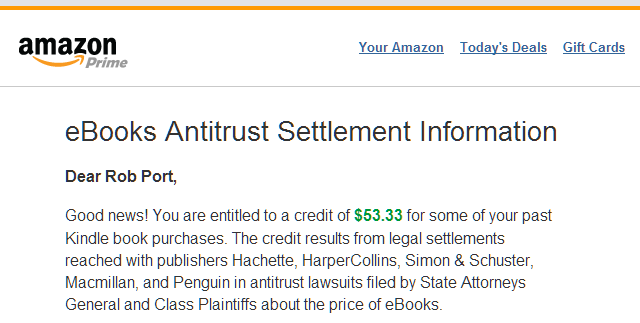Did You Get Some "Dirty" Money From Amazon Today?

Like a lot of other people, I woke up to some money from Amazon in my email inbox. Your mileage will vary – I got $53.33 (I buy a lot of books) and North Dakotans in general got back nearly $390,000 – but the payments result from the settlement of an anti-trust case against book publishers. With e-books and self publishing representing a threat to the traditional hard-copy publishing industry, publishers sought to keep prices for e-books high in order to protect sales of hard-copy books.
Now the publishers have to pay.
Alexander Cohen of the Atlas Society calls it “dirty money.”
You see, a major threat Amazon represented to the publishers was that as customers got used to buying Kindle ebooks instead of hardcovers and paperbacks, it would become easier for authors to reach readers without working with publishers. The major publishers might become obsolete and go out of business. But this shift in the book business was made possible in part by Amazon’s ability to sell the major publishers’ ebooks at low prices in order to tempt consumers to buy Kindle readers and start reading ebooks instead of bound books. That’s why the publishers wanted to raise ebook prices: to protect the hardcover market, where self-publishing is harder. And now money has been taken from the publishers and given to consumers to spend not only on the publishers’ books, but on self-published ebooks.
I don’t mean to knock the self-publishing revolution. I’m part of it: I’ve been involved in publishing more than half a dozen books without major publishers, including The Atlas Society’s Myths about Ayn Rand, The Republican Party’s Civil War, and Rich-Hunt. But the ebook antitrust cases were brought against the publishers, the losers in this revolution, because they tried to get out of helping it along. They’ve been struggling to survive, but antitrust law is forcing them to work for their own destruction.
I’m not sure why it’s illegal for publishers to keep their prices high if they want to. Are we to suppose that those who produce a product are bound to sell it to the public below some arbitrary price? I think the price-fixing was a foolhardy business move by the publishers (screwing your customers is rarely a good move), but just because you or I might think a business practice is poorly thought out or morally wrong doesn’t mean it should be illegal.
The electronic publishing world is flourishing, and there isn’t much the publishers can do to change it. I actually think print publishing will be around for a long time to come yet (despite what my Amazon Kindle refund may say about my reading habits I still buy a lot of print books) for a lot of reasons, and as long as they are they should be able to set their prices where they want them.
The public doesn’t, or shouldn’t, get to tell producers what they sell their works for. Collusion and price fixing are one thing, but is the government controlling prices really any better?




